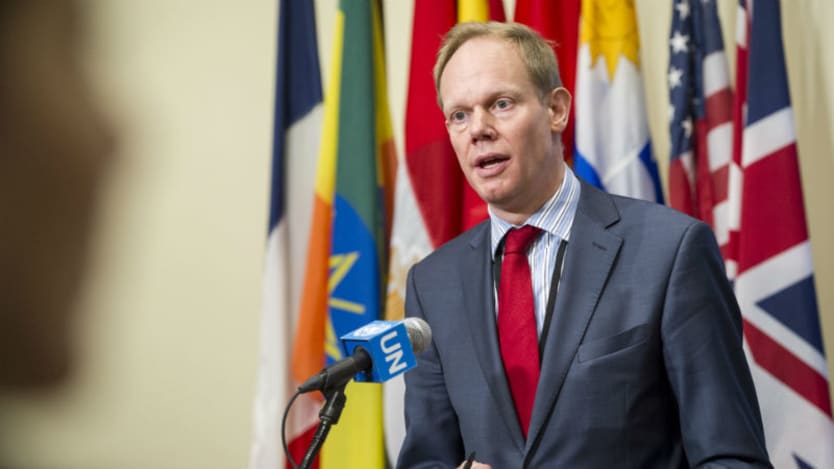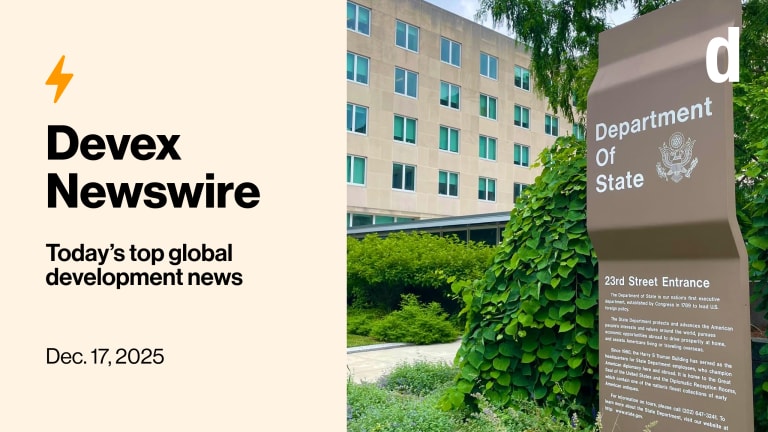
LONDON — Veteran diplomat and former United Kingdom Ambassador to the United Nations Matthew Rycroft started his new job as permanent secretary of the Department for International Development on Monday.
Rycroft, whose diplomatic expertise represents a departure from his predecessors, told staff he was “delighted to be joining DFID as your permanent secretary at this important time.”
He will be serving under the leadership of Secretary of State Penny Mordaunt, who is less than three months into the job.
Rycroft described DFID as having “a fantastic reputation and a crucial mission: To eradicate poverty” — a heartening assertion for much of the community following recent concerns about a waning focus on poverty reduction at DFID and other aid-delivering departments in light of the cross-government strategy.
RESULTS UK Executive Director Aaron Oxley told Devex he was pleased to see Rycroft “use his first public statement to reinforce DFID's 'crucial mission' of poverty eradication,” describing him as “a distinguished international diplomat.”
A career diplomat
Rycroft’s foreign policy background is distinct compared with previous permanent secretaries but coincides with DFID’s pivot toward greater coordination with the Foreign & Commonwealth Office through the cross-government aid strategy. Eight months ago, two “dual ministers” bridging DFID and the FCO were also introduced, posts currently held by Alistair Burt and Harriett Baldwin.
Rycroft’s time with the FCO dates back to 1989, marked by diplomatic stints in the British Embassy in the United States and as ambassador to Bosnia and Herzegovina. Rycroft also served as private secretary to former Prime Minister Tony Blair, advising him on foreign policy, the European Union and defense. It was during his time in the Cabinet Office that Rycroft drafted the infamous “Downing Street memo,” which revealed British government officials’ awareness that military intervention in Iraq would likely go ahead despite “thin” evidence of the existence of weapons of mass destruction.
Rycroft then served as EU director and chief operating officer of the FCO, before being appointed as U.K. permanent representative to the U.N. in 2015.
Some in the aid community heralded Rycroft’s foreign policy expertise as a possible boon for DFID. Alex Thier, director of the Overseas Development Institute, said that, “development is not a technical problem, but a deeply political process. Efforts to eradicate poverty, build peace, and achieve prosperity need to be grounded in political realities and local ownership.”
Thier said Rycroft’s “political and negotiating skills, and experience of navigating complex international processes at the U.N., including the creation of the Sustainable Development Goals, will equip him well for international development challenges such as driving action on climate change, preventing conflict, and responding to emerging challenges.”
Rycroft’s predecessors — Nick Dyer, who served as interim permanent secretary from September 2017; and Mark Lowcock, who served from June 2011 until last year — have both spent the majority of their careers at DFID, with Lowcock departing in September to take up the role of U.N. under-secretary-general for humanitarian affairs and emergency relief coordinator.
Before Lowcock, the position had been held by economists Nemat Shafik and Sir Sumantra Chakrabarti.
Pressing issues
Tamsyn Barton, chief executive officer of Bond, a U.K. network of development organizations, pointed to worsening humanitarian crises and greater clarity in the cross-government strategy as areas that will need Rycroft’s immediate attention.
“[He] has worked on some of the most pressing international emergencies throughout his career. He will be well aware of the humanitarian and development challenges facing the international community including Syria, Yemen, East Africa, and the Rohingya crises,” she said.
Barton added that Bond’s members look forward “to working with Matthew Rycroft to ensure that U.K. aid and development continues to work for the world’s poorest and most vulnerable people,” adding that the NGO community is “keen to see DFID continuing to work with other government departments to ensure aid meets the same levels of effectiveness, transparency, and accountability as DFID” — issues that have been of concern under the cross-government aid strategy.
Last week, members of the development community raised concerns during a House of Commons evidence session that at least two aid-delivering, cross-government funds — the Conflict, Stability and Security Fund; and the Prosperity Fund — lack clear relevance to the poverty reduction mandate.
Thier also hoped Rycroft could ensure that “DFID supports an effective response to a combination of challenges arising in fragile states, including the concentration of extreme poverty, forced displacement, gender-based violence, extremism, and risk of pandemics.”
He said an ability to understand and manage risk “across DFID’s partners and creating the resilience necessary to weather shocks” would be critical.
“To accomplish this, DFID must lead on development internationally and across U.K. government departments,” Thier said.
Nick Dyer remains at DFID as director general for the economic development and international relations directorate.
For more U.K. news, views and analysis visit the Future of DFID series page, follow @devex on Twitter and tweet using the hashtag #FutureofDFID.








